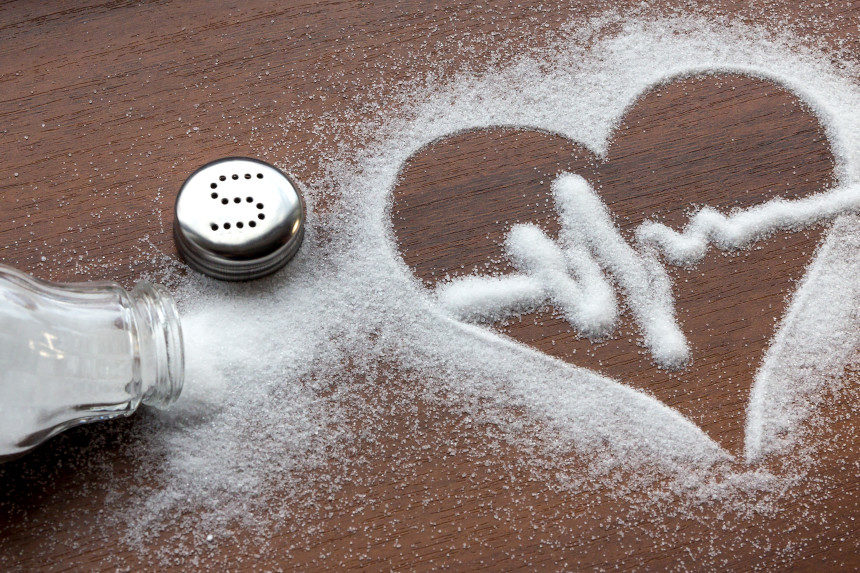“Your Health Checkup” is our online column by Dr. Douglas Zipes, an internationally acclaimed cardiologist, professor, author, inventor, and authority on pacing and electrophysiology. Dr. Zipes is also a contributor to The Saturday Evening Post print magazine. Subscribe to receive thoughtful articles, new fiction, health and wellness advice, and gems from our archive.
Order Dr. Zipes’ books, Bear’s Promise and Damn the Naysayers, A Doctor’s Memoir, and check out his website http://www.dougzipes.com.
As one of the body’s electrolytes, sodium (salt) is a staple of life and necessary for good health. It plays a major role in helping regulate the function of multiple organs, including the heart where it is critical for the normal transmission and contraction of each heartbeat. Sodium is crucial for maintaining a normal fluid balance. An excess can cause high blood pressure and fluid accumulation such as occurs in heart failure, while a deficiency can be responsible for low blood pressure, and in the extreme can cause blackouts or fainting, particularly when standing. The kidneys play a major part in maintaining a proper sodium balance.
Walter Kempner, about whom I wrote in my last column, was one of the first to demonstrate almost 75 years ago that a low sodium rice diet could reduce high blood pressure to normal levels, at a time when no effective therapy existed for diabetes, high blood pressure, or kidney disease.
In 1964 I spent a month as his intern at Duke University Medical Center and helped him manage patients admitted to the hospital with a variety of ailments. They came to eat white rice, fruit, vitamin supplements, and no salt.
We made rice rounds in the morning with an entourage of young doctors, as well as several senior physicians employed by Dr. Kempner. One doctor was an elderly female who performed all the gynecology exams on Dr. Kempner’s female patients. We had just started rounds when she became ashen, sweaty, and complained of chest pain. She was immediately hospitalized, and an electrocardiogram showed she had suffered a heart attack. Dr. Kempner asked me to take care of her.
Though the heart attack was mild, that afternoon her blood pressure fell to dangerous levels. She became short of breath, clammy, and faded in and out of consciousness. I couldn’t figure out what was wrong until I realized she had been eating the rice diet with no salt. She needed saline to raise her blood pressure.
I explained her condition to Dr. Kempner.
“No. Absolutely not. You cannot give salt to my patient.”
Toward early evening, she started to get sicker, but Dr. Kempner was adamant. Lab tests showed she was mildly anemic, and I seized on that fact.
“Can I give her a transfusion?” I asked.
“Blood is okay. No salt,” Dr. Kempner said.
I infused a unit of blood and — directly disobeying his order — followed this with one liter of saline intravenously. Her blood pressure promptly rose, her clinical course stabilized, and she turned the corner.
I was a hero — that is, until the results of her urinalysis came back. Kempner had the hospital collect urine on every rice diet patient to measure the salt content as a check to see who was maintaining the no salt diet.
“Why is there so much salt in her urine, Dr. Zipes?” Dr. Kempner demanded the next morning.
I flushed and fumbled for an answer. “Maybe she got salty blood, sir,” I stammered.
He looked at me a long time, his penetrating dark eyes boring into my brain, knowing full well this was bull. I could see him weighing the situation and deciding what to do.
A quick check of the patient’s chart would reveal my duplicity. Disobeying an order from the staff doctor was grounds for immediate dismissal from the training program, all my hopes and aspirations dashed.
After an eternity, he nodded briefly, spun around, and left. The rest of the gynecologist’s course was uneventful, and she returned to work soon after.
Three years later, in my last year of training as a cardiologist, I was writing my first chapter on heart rhythm disorders for a major textbook. I desperately wanted to attend a conference at Michael Reese Hospital in Chicago on interpretation of complex electrocardiograms, but I had no money to pay for such a trip — even though my salary had ballooned to a staggering $300/month. Duke cardiology claimed poverty, and with regret, the chief of cardiology said he couldn’t send me.
I made an appointment to see Dr. Kempner. Would he remember me? Would he be angry? He could still have me fired for disobeying him.
“Dr. Kempner, do you remember me?” I asked, standing in front of his desk. I wiped moist hands on my pants.
He set down the medical journal he was reading, pushed back from his desk, and peered at me over glasses perched at the end of his nose.
“Ah, yes,” he said, “I do remember. The intern who gives salty blood to my patients.” A hint of a smile teased the corners of his eyes and I relaxed a little. I realized I had been holding my breath, exhaled, and sucked in some air.
“What can I do you for you?”
I explained that I wanted to attend this conference and had no money. “How much do you need?” he asked.
I said, “I think $250 will cover the plane ticket and hotel.”
He didn’t say a word, opened his desk drawer and removed a checkbook. He looked up at me for a long second before writing, then down at his checkbook. He penned the check, ripped it from the ledger, and handed it to me. I thanked him and glanced at it — $300.
Before I left, he transfixed me once again with those piercing eyes. “Sometimes it’s better to follow your own conscience,” he said, pushing his glasses back up on the bridge of his nose. He nodded my dismissal and returned to his reading.
Some 40 years later Duke awarded me the Distinguished Alumnus Award. I was sad that Dr. Kempner was not around for me to thank for the important role he played in my career.
The anecdote about Kempner was abridged from my memoir, Damn the Naysayers, published by iUniverse, 2018.
Featured image: Sharif Pavlov / Shutterstock
Become a Saturday Evening Post member and enjoy unlimited access. Subscribe now



